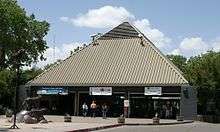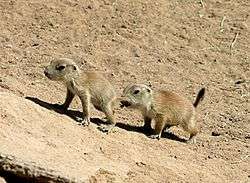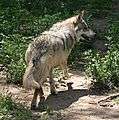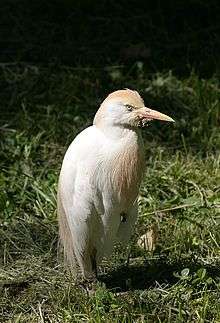Rio Grande Zoo
Founded in 1927, the 64-acre (26 ha) Rio Grande Zoo, located in Albuquerque, New Mexico, is a facility of the Albuquerque Biological Park. After a branding change, the Albuquerque Biological Park dropped "Rio Grande" from the name; the zoo is now called ABQ BioPark Zoo. Some of the most popular of the over 200 species are seals and sea lions, chimpanzees, gorillas, orangutans, elephants, polar bears, giraffes, hippos, camels, tamarins, koalas, Mexican wolves, cougars, monkeys, jaguars, zebras, and rhinos. Sections of the zoo include an Africa exhibit area, an Australia exhibit area, the "Cat Walk" and herpetology area. An endangered species carousel was added in 2016. A narrow-gauge railroad connects the zoo to the other facilities of the Albuquerque Biological Park. Walking distance through the zoo is 2.27 miles (3.65 km).
 Main entrance | |
| Date opened | 1927[1] |
|---|---|
| Location | Albuquerque Biological Park, Albuquerque, New Mexico, United States |
| Coordinates | 35.0776°N 106.6627°W |
| Land area | 64 acres (26 ha)[1] |
| No. of species | 200+[1] |
| Memberships | AZA[2] |
| Website | www |
The Albuquerque Biological Park is an accredited member of the Association of Zoos and Aquariums (AZA).[2]
Animals
The Rio Grande Zoo exhibit animals that pertain to various geographical areas. The zoo is divided into continents.
Africa
Reticulated giraffe, Grevy's zebra, white rhinoceros, common chimpanzee, spotted hyena, cheetah, marabou stork, lappet-faced vultures, Cape griffon vultures, hippopotamus, lion, rock hyrax, slender tail meerkat, serval, African crested porcupine, lowland gorilla, ankole, red river hog, warthog, hammerkop, saddle-billed stork, Stanley crane, cattle egret, dromedary camel, wolf guenon, DeBrazza's monkey, klipspringer, Madagascar ground boa, Madagascar tree boa, ostrich, African grooved frog, Lady Ross turaco, Aldabra tortoise, African wild dog, African pancake tortoise, Sudanese plated lizard, and African Slender-snouted Crocodile.
Australia/Oceania
Tasmanian devil, koala, echidna, Matschie's tree kangaroo, saltwater crocodile, lorikeet, carpet python, princess of wale's parakeet, wompoo fruit dove, emu, red kangaroo, laughing kookaburra, budgerigar, Micronesian kingfisher, palm cockatoo, Major Mitchell's cockatoo.
Asia
Asian elephant, Bactrian camel, snow leopard, Malayan tiger, red panda, king cobra, reticulated python, Indian python, wrinkled hornbill, pygmy slow loris, slow loris, orangutan, siamang, Komodo dragon, Chinese alligator, takin, Mandarin duck.
Arctic
North America
Bobcat, cougar, copperhead, milk snake, garter snake, desert tortoise, alligator, bison , black-tailed prairie dog, California sea lion, Mexican wolf, bald eagle, great horned owl, roadrunner, axolotl, golden eagle, turkey vulture, tiger salamander.
South and Central America
Caribbean flamingo, scarlet ibis, golden lion tamarin, spider monkey, howler monkey, Cuban amazon, hyacinth macaw, scarlet macaw, golden-collared macaw, Andean tinamou, vine snake, blue poison dart frog, green anaconda, angelfish, toco toucan, sunbittern, red-bellied piranha, emerald tree boa, tree boa, boa constrictor, dwarf caiman, jaguar, ocelot, two-toed sloth, military macaw, Andean condor, crested caracara, thick-billed parrot, hawk-headed parrot, cotton-top tamarin, sun conure.
Former species
Saiga antelope, Persian goitered gazelle, Himalayan tahr, West Caucasian tur, Gemsbok, Greater kudu , Banteng, Siberian ibex, Markhor, Sichuan takin, Pronghorn.
Exhibits
Flamingo Crossing
An island located at the beginning of the zoo that holds the zoo's flock of Caribbean flamingos.
Reptile House
The reptile house was remodeled in 2012 to include taipans, death adders, Chinese alligator, and alligator snapping turtle. With the renovations the building houses mostly reptiles. The exhibit houses many species of cobras, rattle snakes, and lizards. There are two large areas where the zoo's Komodo dragons are held. In a building located near the Reptile House the zoo's temporary home for a large adult salt water crocodile and for Slender-snouted crocodile. On the outside of the Reptile House is the new Gator Swamp Exhibit, which is a large outdoor heated pool housing several adult American alligators. The reptile house received more renovations in 2017 to improve digital interpretive signage and interactive displays. Other species on display in the true reptile house as of 2017 include: Bismark ringed python, Asian water monitor, Quince monitor, Cottonmouth, Mata mata Turtle, Black Mamba, Storr's monitor, Green Anaconda, Jumping Viper, Western Diamondback Rattlesnake, Gila Monster, Grand Cayman Blue Iguana, Rhinoceros Viper, White-Lipped Viper, Red Spitting Cobra, and Black Spitting Cobra.
Phoenix Plaza
The Phoenix Plaza Snackbar and is seasonal. There is a curve array of exhibits mostly housing birds. Species housed here include: Ground hornbill, Helmeted guineafowl, Buff-crested bustard, Lady Ross's Turaco, Roadrunner, Northern Helmet Curassow, Gray-winged Trumpeter, Scarlet Ibis, Cattle Egret, Black Spurred-wing Goose, Cuban Amazon Parrot and a family of Black Howler Monkeys.
Raptors
Several large exhibits that hold the zoo's bald eagles, golden eagles, ferruginous hawk, crested caracaras and Andean condors as well as other birds.
Mexican Wolf Exhibit
This exhibit holds the zoo's pack of Mexican wolves, the most endangered species of wolf in the United States.
Inukshuk Bay
It offers many views of the polar bear. One can see them through underwater viewing windows or walk to the top of the exhibit and watch the bears lounge, feed, and slide down the waterfall.
The Cat Walk
Grottos in this exhibit hold African lions, cougars, snow leopards, jaguars, a Malayan tiger, ocelots, and red kangaroos. Smaller exhibits hold great horned owls, Fossa, African crested porcupine, bobcat, serval and meerkats. The Jaguars received a second large yard with pool and natural foliage in 2017. The zoo's two Jaguars will rotate between the two yards.
Amphibians: Life on a Limb
With the renovation of the Reptile House in 2012, the zoo opened up Amphibians: Life on a Limb, replacing the original Gator Swamp, where the zoo used to hold its juvenile alligators. The building houses poison dart frogs, hellbenders, and caecilians as well as other amphibians. The zoo also houses the only captive population of locust coquis, critically endangered frogs from Puerto Rico.
Asia
This exhibit contains several elephant yards and two barns for the zoo's Asian elephants. The exhibit now holds six Asian elephants in its herd, two males and four females. Rozana, also called Rozie, was born in the Rio Grande Zoo on November 8, 1992. On Sept. 2, 2009, Rozie gave birth to female elephant Daizy. Rozie gave birth to her second calf, Jazmine, on October 2, 2013. The virus, elephant endotheliotropic herpesvirus claimed Daizy's life on May 9, 2015. Rosie is expecting her third offspring in 2018. There is also an exhibit housing Bactrian camels nearby.
Seals and Sea Lions Exhibit
Large exhibit with underwater viewing tank that houses sea lions, gray seals, and harbor seals.
Australia/Koala Creek
This area is under construction, but the open areas to the public house koalas, Matschie's tree kangaroos, and walk-through budgerigars aviary. Exhibits for tawny frogmouth and Sulphur-crested cockatoo are found nearby. This area also is home to the zoo's Tasmanian devils. There are only a few zoos in the US that house these animals. The zoo also has on exhibit the only Tasmanian wombats in the United States. A seasonal Lorikeet feeding station is found inside the Lorikeet exhibit that houses Rainbow Lorikeets, Red Lory, and Chattering Lory. A new emu yard was added in the location of the old Ankole yard.
Nightwatch
Exhibit holding slow loris and pygmy lorises. The connected outdoor exhibit is home to a pair of black and white ruffed lemurs.
Africa
Six acres of land holding 17 separate exhibits and 23 species of mammals and birds. Mammals include chimpanzees, warthogs, red river hogs, cheetahs, Hartmann's mountain zebras, white rhinoceroses, hippopotami, klipspringer, De Brazza's monkey, spotted hyenas and African wild dogs. Birds include including marabou storks, Cape griffon vultures, lappet-faced vultures, wattled cranes, common ravens, hammerkops and saddle-billed storks.
Apes
Holds the zoo's gorillas, orangutans, and siamangs. A Gorilla Bacholors Pad is found near the Nightwatch as well. The siamangs welcomed a new addition on April 5, 2017 - a new baby named Eerie.
Fowl Play
An aviary exhibit which includes hyacinth macaw, sun conures, burrowing owl, and roadrunners.
Future Exhibits
- The zoo plans on opening an Asia exhibit. No further information has been given.
- Penguins Chill exhibit - The zoo plans opening a $12 million exhibit in 2018 to house Antarctic penguins. Species include: king penguin, gentoo penguins and macaroni.
Former Exhibits/ Former Residents
Frances V.R. Seebe Tropical America building
Indoor rainforest that housed golden lion tamarin, cotton-top tamarin, spider monkey, howler monkey, Cuban amazon, Andean tinamou, vine snake, green anaconda, angelfish, red-bellied piranha, toco toucan, sunbittern, emerald tree boa, two-toed sloth, shovel nosed catfish, redtail catfish, and bats.
Ankole Cattle exhibit
Located at the end of the Africa section, it has been updated and now houses Emu at the end of the Australia section.
Echidna
A simple nocturnal exhibit in the Australia section housed echidna.
Lemurs
The current Lemur exhibit has housed Lemurs at different times. In the 1990s-early 2000s it housed Black-and-white ruffed lemurs and Red ruffed lemurs. After a period housing tree kangaroos, Lemurs returned. Blue-eyed black lemurs were housed in the exhibit temporarily.
Reptile House
The building initially held zoo's reptiles and amphibians. However, now the amphibians are found in Amphibians Life on Limb. Former Reptile species held include: Death Adders, Taipan.
Catwalk/predators
This section of the zoo has housed many species of animals throughout its time. It has housed Leopards, Clouded Leopards, Tayra, Hyraxes, Red Panda, and Reeve's Muntjac, among others. The final exhibit, the Tiger yard has housed White Bengal Tigers and Bengal Tigers in the past.
Emu Yard in Cat walk
Remodeled into a larger Jaguar yard. Emus relocated into Australia.
Zebra Yard
The Zoo formerly housed Grevy's Zebra in the Zebra Exhibit as well as Ostriches. In addition, prior to the zebras’ arrival in 2002, the yard housed Bison.
Bear Grottoes
Between 1972 and 1996, three grottoes located between the present Wolf and Polar Bear habitats housed Polar Bears, Grizzly Bears, and Malayan Sun Bears. The grottoes still stand as of 2020, albeit vacant and fenced off to the public.
Gallery
 Two juvenile black-tailed prairie dogs
Two juvenile black-tailed prairie dogs A sleeping male African lion
A sleeping male African lion

 Old Rio Grande Zoo sign at zoo entrance
Old Rio Grande Zoo sign at zoo entrance The train engine crossing a path in the zoo
The train engine crossing a path in the zoo
See also
Notes
- "Zoo". City of Albuquerque. Retrieved 30 April 2011.
- "Currently Accredited Zoos and Aquariums". aza.org. AZA. Retrieved 30 April 2011.